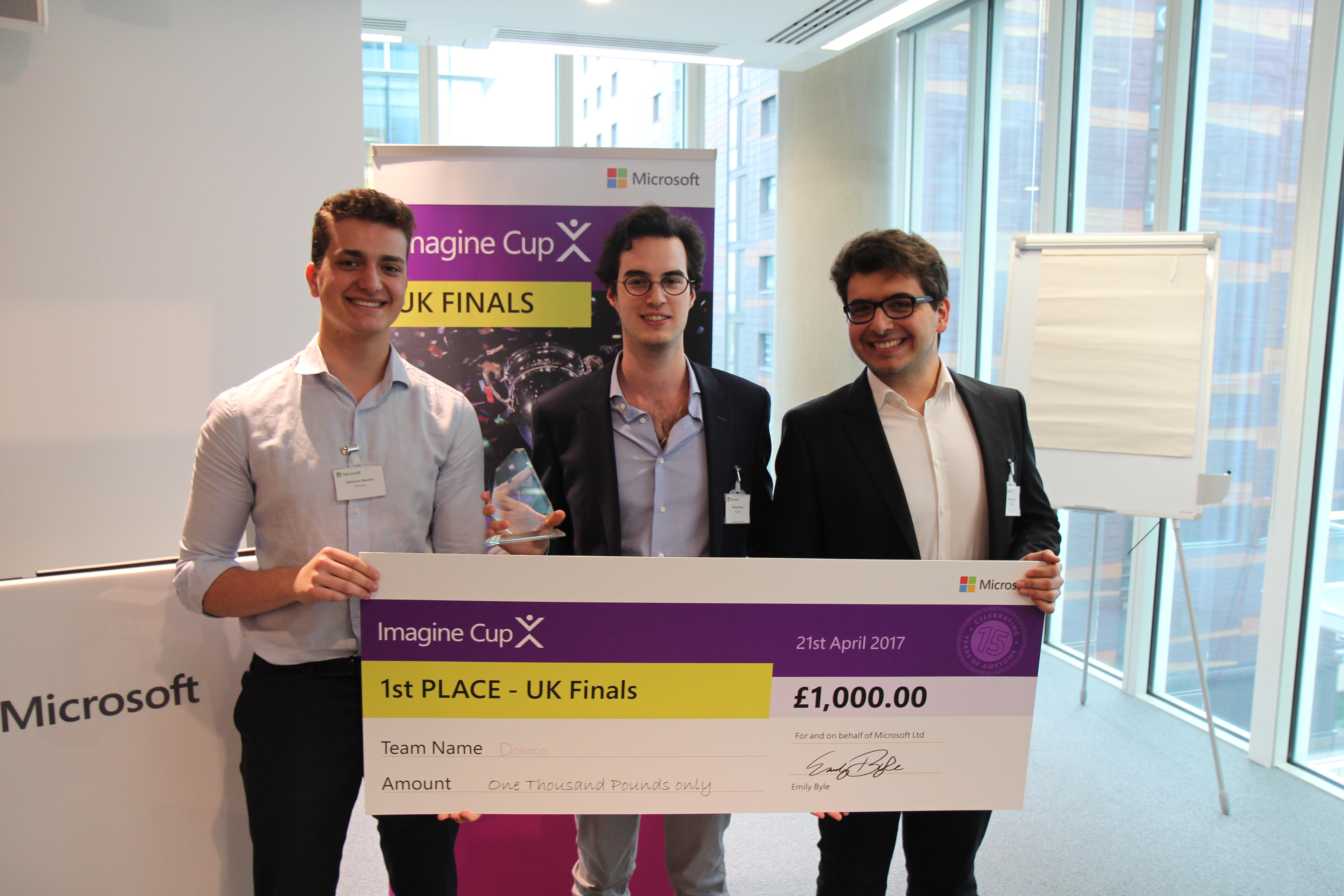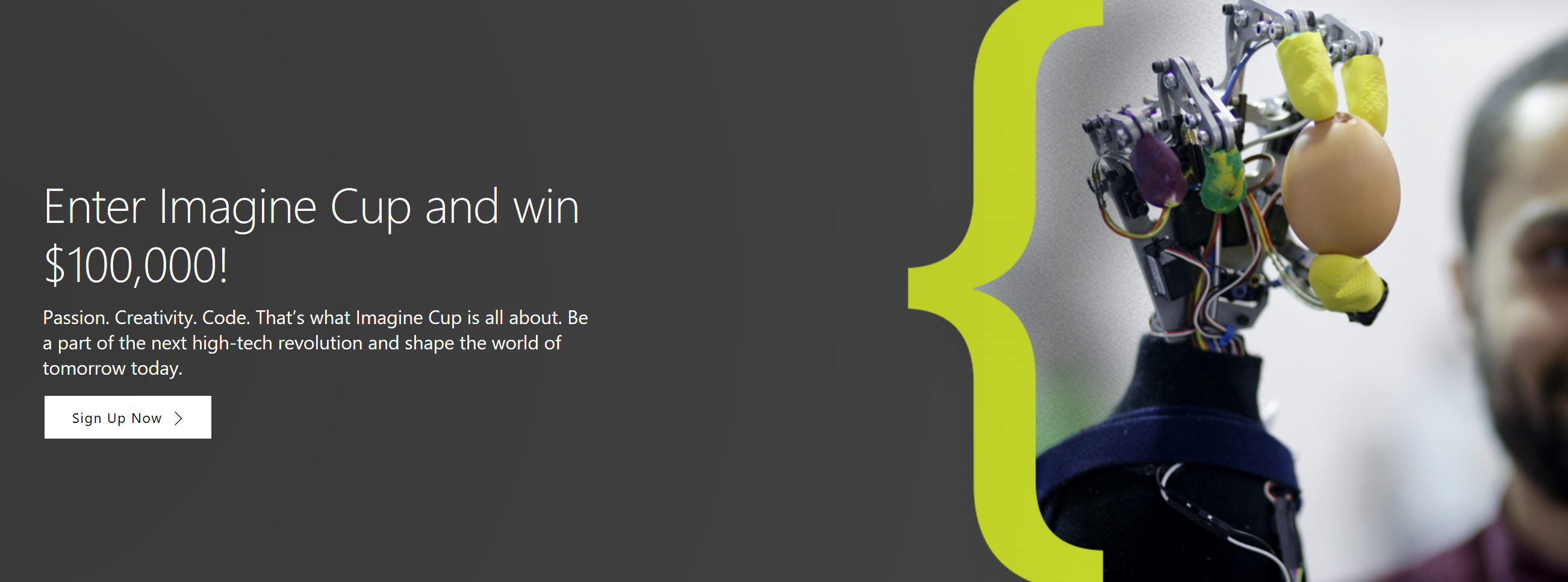
Imagine Cup: charity app gives young UK developers the chance to win $100,000
An application that makes it easier for people to donate money to charity has won its creators a place at the Imagine Cup final, where they will compete to win $100,000.
Donaco uses artificial intelligence to place pop-up boxes next to relevant news articles that allow readers to instantly give money to that cause. The team behind the app hope that it will lead to more money being given to charity as well as give news outlets new ways to engage with readers.
The Imagine Cup is a global competition run by Microsoft and aimed at developing the next generation of computer science experts. Harnessing their passion for technology, young developers are encouraged to build applications with the potential to change the way we live.

Donaco
Students from universities across the country recently pitched their proposals to a panel of experts at Microsoft’s London office in the UK final of the competition.
The creators of Donaco – Michael Moses, Suleiman Mashini and Philippe Torbey, from Imperial College London – won £1,000 and will now travel to Microsoft’s global headquarters in Redmond, Washington, in July for the grand final.
“The idea first came about when I was reading about the refugee crisis,” said Moses. “I was frustrated as I didn’t know what I could do, and that wasn’t the first time. [The win] was very unexpected. We look forward to working with Microsoft more closely and taking Donaco to the next phase.”
Moses also highlighted how the Imagine Cup would offer Donaco more exposure to the business world. “Opportunities like the Imagine Cup are really important. There are loads of students with interesting ideas, but nobody really has a path to push them forwards or understands how. We understand the technology aspect, but getting advice on things like pitching and scaling is great.”
The team from UCL beat rivals who were using machine learning to enhance social media, and improving how people order food from shops to increase customer satisfaction, among other ideas.
Gaming apps were also popular. Obviously Games, a team praised by the judges for their innovative combination of virtual reality and augmented reality, were impressed with Imagine Cup. “We have a great team at our university,” said team member Cameron McPherson, “but it’s great to come to events like this and meet people from other universities who work in different industries and have new ideas.”
Learn more about the Imagine Cup
Other submissions looked at more significant societal challenges. Keisuke Kishi took joint third place with Root, an application to tackle declining agricultural production in Japan by gamifying farming for urban residents.
PEACH Reality’s app, meanwhile, addressed financial and logistical pressures in the healthcare sector (below). “We hope our idea might save the NHS money, and reduce the time doctors take to diagnose patients,” said team member Timur Kuzhagaliyev. “The Imagine Cup is a great chance for us to get funding and open new horizons for our project.”
In accordance with the rules of the competition, each application was run on Azure, with most teams using the Microsoft cloud service’s built-in APIs. The entrants were also all supported by an expert mentor, either from Microsoft or from the technology and business sectors, who offered feedback and help to develop ideas.
Alex Bochenski, a past Imagine Cup winner, shared his student-to-start-up journey at the event. His team won the global title in 2013 with a mobile phone streaming app called SoundSYNK, after which they were invited to join the Microsoft Accelerator programme in London. The team graduated from the Accelerator having launched a successful service that helps developers build mobile apps by synchronising data across different platforms.
Riham Satti, a past entrant who made it to the UK national finals, described how participating in the Imagine Cup helped her and a teammate start their own successful company. “We wouldn’t be here if it wasn’t for the Imagine Cup,” she said. “We both came from an academic background and I wasn’t into business at all. The Imagine Cup has really been an eye-opener for us into the start-up entrepreneurial route – it’s where we first came across the whole notion of pitching.”
This is the 15th year of the Imagine Cup, with applications for next year’s event opening in October.
“The Imagine Cup represents an opportunity for entrepreneurial and technological students to challenge themselves to achieve more – becoming future start-ups, developers or anything else they choose,” said Emily Byle, Audience Marketing Manager at Microsoft. “This competition helps to show why we should be investing in students.”


